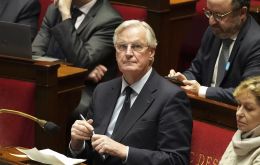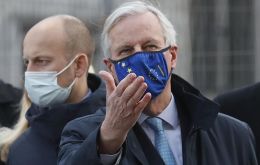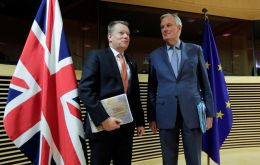MercoPress. South Atlantic News Agency
Tag: Michel Barnier
-
Thursday, December 5th 2024 - 09:46 UTC
French PM loses vote of no confidence for the first time since 1962

French Prime Minister Michel Barnier has been forced to resign after losing a vote of no confidence Wednesday prompted by budget disputes. However, he will likely stay as a caretaker PM until President Emmanuel Macron finds a replacement. Barnier's appointment took Macron nearly two months after July’s parliamentary election. The National Assembly approved the motion by 331 votes, far exceeding the minimum 288 needed. The political standoff has unsettled financial markets, with borrowing costs rising sharply amid fears of prolonged instability.
-
Friday, September 6th 2024 - 21:42 UTC
Macron picks the seasoned Barnier for French PM job

The 73-year-old Barnier has served four times as a cabinet minister and as the European Union's chief Brexit negotiator. On July 16, Macron accepted Gabriel Attal's resignation but asked him to stay in office on a caretaker basis until a replacement could be found.
-
Wednesday, December 23rd 2020 - 09:30 UTC
Brexit “final push”: EU prepared to yield in fisheries issue but UK proposal “totally unacceptable”

The European Union is making a “final push” to strike a Brexit trade deal with Britain, although there are still deep rifts over fishing rights, the bloc’s chief negotiator said on Tuesday.
-
Monday, November 30th 2020 - 09:27 UTC
Britain and EU on the “last leg of negotiations” for a post Brexit trade deal

The UK is in the “last leg of negotiations” with the EU over a post-Brexit trade deal, the foreign secretary has said. Dominic Raab told the BBC it was likely the talks were entering the “last real major week”, and an agreement remained possible if the EU showed “pragmatism”.
-
Monday, September 7th 2020 - 08:59 UTC
France to UK: Brexit negotiator Barnier is not stepping down or being sidelined

France denied the European Union's Brexit negotiator Michel Barnier was about to be sidelined by EU leaders in a bid to break the deadlock in trade talks, as reported by British newspaper the Daily Telegraph.
-
Thursday, June 25th 2020 - 09:30 UTC
UK stands for Falklands' squid in post-Brexit trade talks, Financial Times

UK has been standing out for the Falklands and its squid and fish sales to the European Union, according to an article from the Financial Times, credited to Jim Brunsden in Brussels, and referred to the post-Brexit EU/UK trade talks.
-
Saturday, May 16th 2020 - 07:49 UTC
Britain-EU round of post Brexit talks end with scant progress

Britain and the European Union urged each other on Friday to give ground in talks over a post-Brexit trade deal or risk failure in tetchy exchanges after the latest bout of bargaining ended with scant progress.
-
Tuesday, April 21st 2020 - 10:00 UTC
UK and EU resume a week long round of Brexit trade talks; IMF concern, urges extension of deadline

British and European Union (EU) officials restarted on Monday a week-long round of Brexit trade talks after a break because of the coronavirus, which is making an end-of-year deal look even more unlikely. After a first-round in early March negotiations were suspended for six weeks as officials focused on the deadly virus sweeping Europe.
-
Monday, February 3rd 2020 - 07:58 UTC
UK and EU begin this Monday post-Brexit negotiations

Britain on Sunday began to detail a hard-line stance in upcoming negotiations with the European Union on future relations, following its historic departure from the bloc. Foreign Secretary Dominic Raab, who will embark on a tour of Asia and Australia this week as he looks to pave the way for global trade deals, warned that London will not accept alignment with EU rules.
-
Wednesday, December 18th 2019 - 09:27 UTC
Johnson pledges post-Brexit transition in 2020; Queen sets the legislative program of new government Thursday

Britain's government said on Tuesday it will legislate to ensure a post-Brexit transition period does not extend beyond 2020, sending the pound sinking as the European Union warned of a race against time to agree new trade terms.
